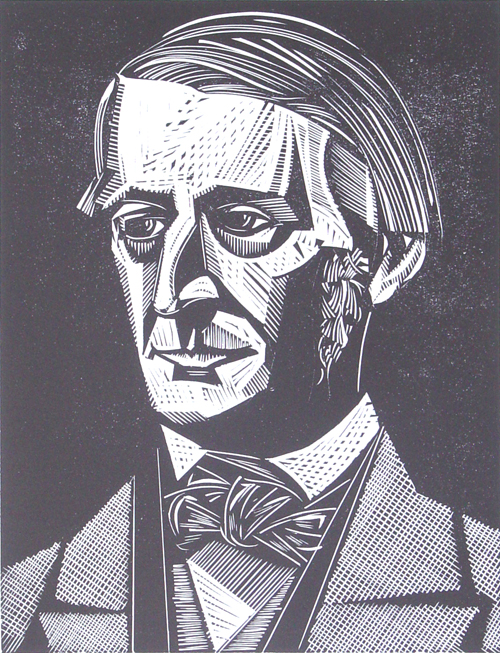
After reading Emerson's speech, "American Scholar," answer the following questions as a comment:
How does Emerson's description of "Man Thinking" compare to Gramsci's understanding of the traditional and organic intellectual? Are there forms, sources, and understandings of knowledge that Emerson identify as forms of "spontaneous consent" as defined by Gramsci? What does Emerson describe as the ideal "social function" of the scholar? Is his image of the scholar a hegemonic or counter-hegemonic one?
How does Emerson's description of "Man Thinking" compare to Gramsci's understanding of the traditional and organic intellectual? Are there forms, sources, and understandings of knowledge that Emerson identify as forms of "spontaneous consent" as defined by Gramsci? What does Emerson describe as the ideal "social function" of the scholar? Is his image of the scholar a hegemonic or counter-hegemonic one?

9 comments:
Emerson and Gramsci got similar styles like Emerson compares the man as a monster and Gramsci compares men into two levels of intellectuality. Emerson uses the way a man thinks by what his profesion is and Gramsci compares the way someone thinks by what intellectual he falls into, the organic or the traditional. Emerson talks also about superstructures just like Gramsci but his ideas about the social structures are a little different like Emerson talks about the superstructures as what profesion or job the man has or does and Gramsci talks about superstructures as different social functions as intellectuals and or individuals.
-KEYLA HERNANDEZ
Emerson and Gramsci got similar styles like Emerson compares the man as a monster and Gramsci compares men into two levels of intellectuality. Emerson uses the way a man thinks by what his profesion is and Gramsci compares the way someone thinks by what intellectual he falls into, the organic or the traditional. Emerson talks also about superstructures just like Gramsci but his ideas about the social structures are a little different like Emerson talks about the superstructures as what profesion or job the man has or does and Gramsci talks about superstructures as different social functions as intellectuals and or individuals. The Emerson's idead I believe is counter hegemonic because he talks about the scholar thinking about what is knowdlege and they talk about their own ideas and thoughts but at the smae time I thik that it is hegemonic because in a way when your a scholar the gorvernment chooses what you learn and from theat the scholar decides waht they will study and teach people about certain things.
-KEYLA HERNANDEZ
The "Man Thinking" concept and Gramsci's concept of all people being intellectuals, either traditional or organic, are similar. Both credit all people with higher thinking and consideration of philosophy, from the professor to the farmer.
Emerson identifies reading books as a form of "spontaneous consent". He says that the people who rely on books for knowledge and learning make up the "third estate", the common people.
The "ideal function" of a scholar is to clearly and objectively see and judge the world and record what he learns. The scholar should be the world's "heart" and "eye". He must also resist bias and "barbarism” as he utters his "commentary on the world of actions".
These views are largely counter-hegemonic in that he recognizes the hegemony in society and comments on it, he discredits book-learning and the traditional scholar, and he suggests that all people are united in their identity as the "Man Thinking".
Kassie Doyle
Emerson's description of "Man Thinking" compares to Gramsci on several levels when it comes to his understanding of the traditional and organic intellectuals. Both Emerson and Gramsci believe that man have a way to higher thinking. All men are intellectuals-whether a farmer or a professor of a college.
They both also believe that man should be their own indiviual. "In the degenerate state, when the victim of society, he tends to become a mere thinker, or, still worse, the parrot of other men's thinking."
Both use superstructures as examples in their writings, however they fall on different levels.
Both men express counter-hegemonic views on a larfge scale because they both comment on "normal" views and discredit them.
~jewels
Emerson believes there are two types of scholars, the victim of society which is simply a thinker or "The parrot of other man's thinking" and the "right" scholar which is Man Thinking. Emerson describes the scholar as the delegated intellect which Gramsci organizes in two separate categories, traditional and organic intellectuals. Emerson believes Man thinking is the scholar who can learn from nature, influences from the past such as books, and action. Gramsci's organic intellectual is the equivalent to Emerson's Man Thinking. Gramsci's traditional intellectual is who Emerson sees as the victim of society.
Some forms of "spontaneous consent" is being slow to Reason. He says "Colleges are built on it.Books are written on it by thinkers, not by Man Thinking...Men who set out from accepted dogmas." These victims just accept what is taught in the schools instead of questioning and reasoning because the majority of society accepts it.
Emerson describes the ideal social function as Man Thinking, learning from nature, the past and future, and your actions, actually doing something to make a difference.
His image of the scholar is counter-hegemonic, not being subject to what you should do belive and say because the government and state says its right.
Ronnie Lewis
Emerson and Gramsci have similar ideologies. They both view society and its role through different perspective.
Both Gramsci and Emerson believe in the individual, and support the idea of breaking away of the traditional molds of society. They stress strong personal achievement, thinking, and being.
Gramsci and Emerson are both portraying counter-hegemonic ideologies throughout their writing. The recognition of society's flaws in conformity, non-individuality, and government's negative impact are similar concepts that both of these men discuss as well.
-Kelly
Emerson and Gramsci have similar ideologies. They both view society and its role through different perspective.
Both Gramsci and Emerson believe in the individual, and support the idea of breaking away of the traditional molds of society. They stress strong personal achievement, thinking, and being.
Gramsci and Emerson are both portraying counter-hegemonic ideologies throughout their writing. The recognition of society's flaws in conformity, non-individuality, and government's negative impact are similar concepts that both of these men discuss as well.
-Kelly
Emerson and Gramsci seem to mean essentially similar things with only a few differentiations.
both accredit all with thought and intellectualism.
Emerson's 'Man Thinking" corresponds pretty well with Gramsci's organic intellectual idea. Emerson's divergence from Gramsci, however, seems to be that he believes the "true scholar" to be an organic intellectual as well as a traditional intellectual (one may asume the traditional because one must be traditionally literate to be a "scholar"). Both Gramsci and Emerson have some condescension and disdain for the traditional intellectual (e.g. the "third estate" line). This arguably hypocriical considering how steeped in traditinal intellectualism they both must've been and how much they used the conventions in place to communicate their ideas to other/readers/posterity/us. the ideal vision presented by Emerson of the "true scholar" seems to be that of an organic intellectual who has managed to succeed in the system of traditional intellectuals, a perticipant in a hegemonic system who brings a bit of his own counter-hegemony to the table.
shenzi
Emerson's concept of "man thinking" is very similar to Gramsci's defenition of organic and traditional and intellectuals. Gramsci classifies intellectuals based on their profession and he stresses the fact that every man is an intellectual. An organic intellectual would be a farmer or a carpenter who is knowledgeable of a specific field of work. A traditional intellectual would be someone who may have gone to college and studied to perform their work like a lawyer or a therapist. Emerson believed that in order for a man to think they had to act as well. A man doesn't think simply by reading a book or learning a fact they must put their thoughts into action and learn from experience."there is virtue in yet in the hoe and the spade, for learned as well as for unlearned hands Emerson's ideal social function of the scholar is hegemonic because he believes that men should learn from their own experience and not only by what they read and hear from the voices of the past. Tells people to break free from "spontaneous consent," by not agreeing with everything you are taught.
-semone s.
Post a Comment